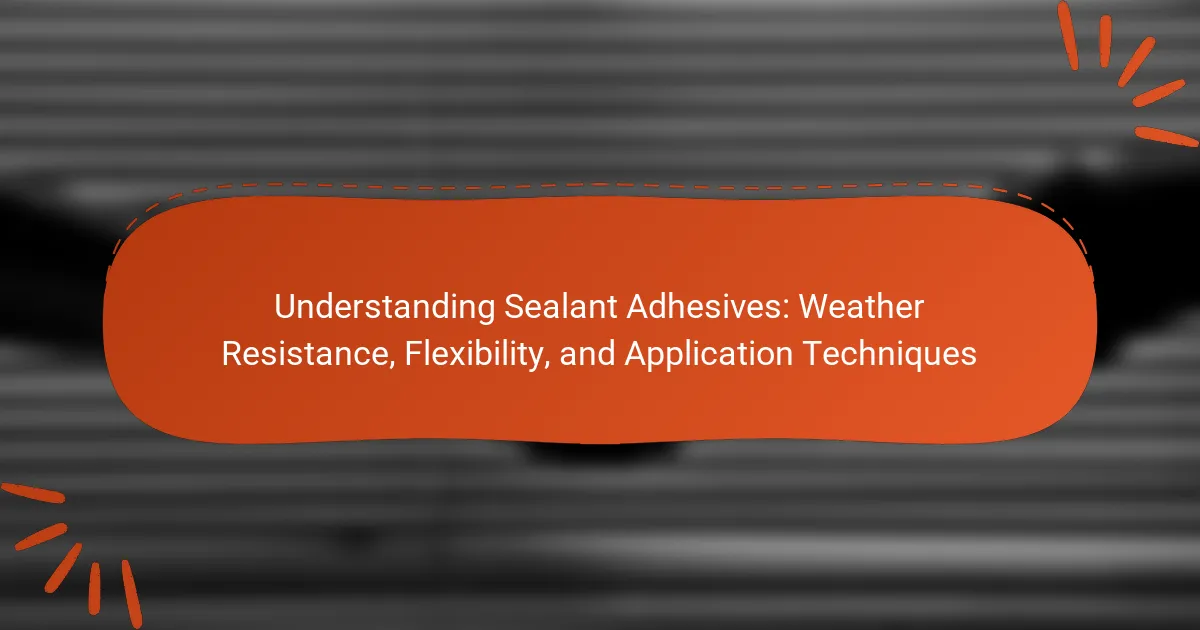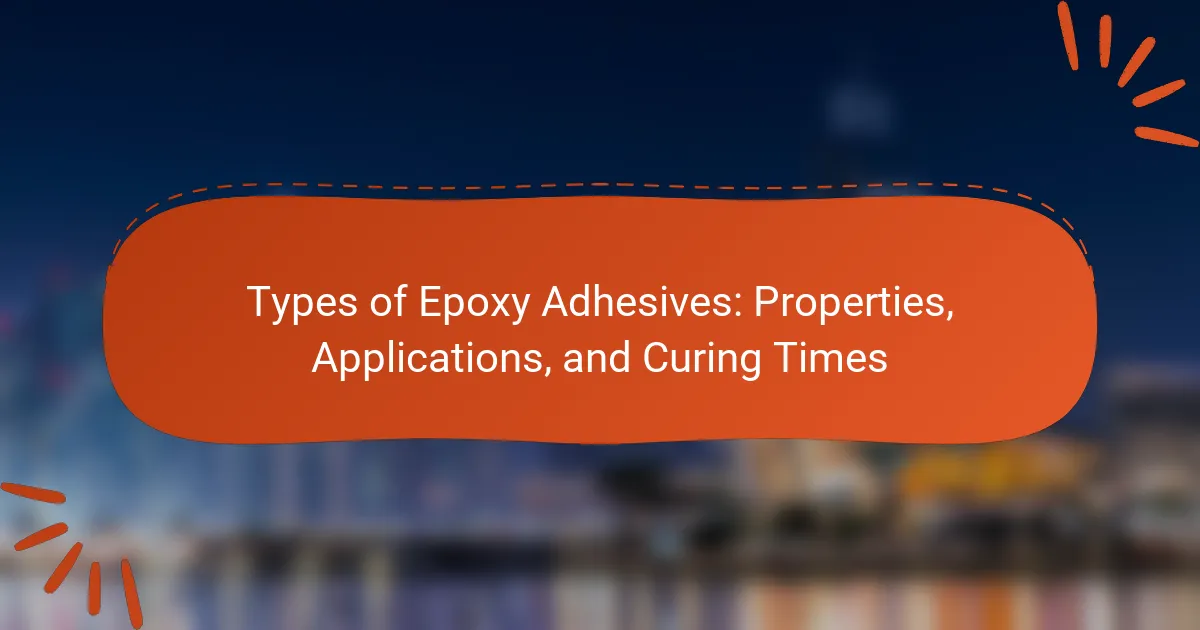Specialty adhesives are unique bonding agents formulated for specific applications, distinguished from general-purpose adhesives by their tailored performance characteristics. These adhesives, including types such as epoxy, polyurethane, and cyanoacrylate, are essential in industries like automotive, aerospace, electronics, and medical devices due to their ability to bond dissimilar materials and withstand extreme conditions. The article explores the diverse applications of specialty adhesives, highlighting their role in enhancing performance in demanding environments. Additionally, it examines current market trends, indicating a projected growth in the specialty adhesives market driven by technological advancements and an increasing focus on eco-friendly options. The Asia-Pacific region is noted for its significant growth, reflecting rapid industrialization and urbanization.
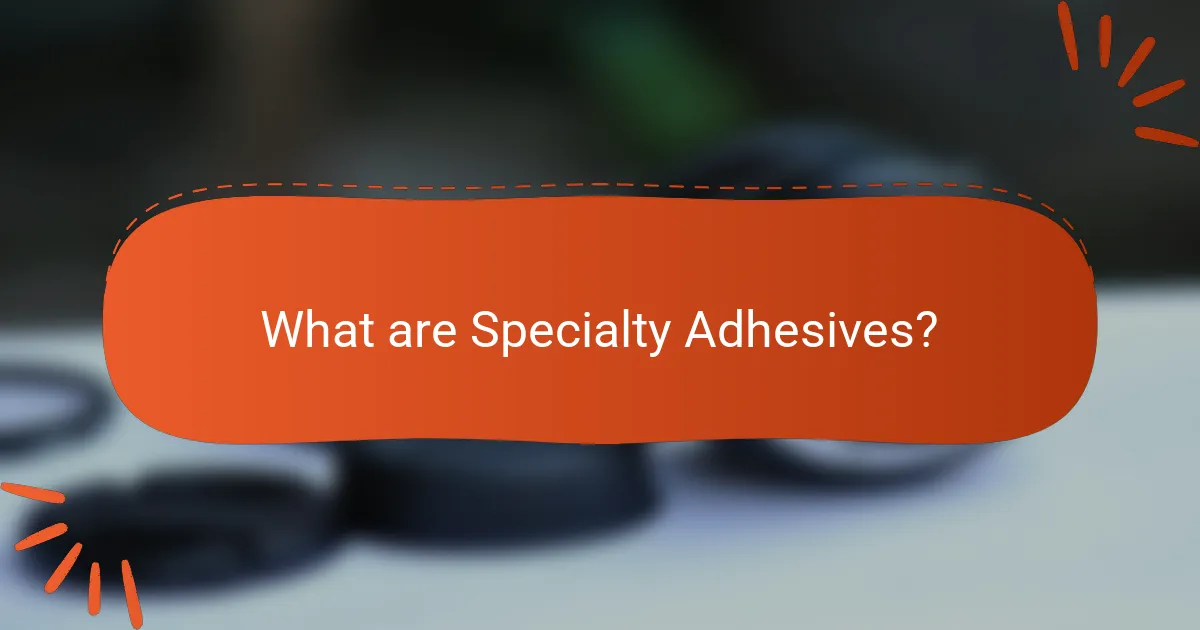
What are Specialty Adhesives?
Specialty adhesives are unique bonding agents designed for specific applications. They differ from general-purpose adhesives in their formulation and performance characteristics. These adhesives are tailored to meet particular requirements, such as temperature resistance, flexibility, or chemical stability. Common types include epoxy, polyurethane, and cyanoacrylate adhesives. Specialty adhesives are often used in industries like automotive, aerospace, and electronics. Their unique properties enable them to bond dissimilar materials effectively. For example, epoxy adhesives can withstand extreme temperatures and provide strong structural bonds. Overall, specialty adhesives enhance performance in demanding environments, making them essential in various high-tech applications.
How do Specialty Adhesives differ from regular adhesives?
Specialty adhesives differ from regular adhesives in their formulation and application. Regular adhesives are designed for general use, while specialty adhesives are tailored for specific materials or conditions. Specialty adhesives often provide superior bonding strength, flexibility, or resistance to environmental factors. For instance, some are formulated to withstand extreme temperatures or moisture. Regular adhesives may not perform well under such conditions. Additionally, specialty adhesives can bond unique substrates like plastics, metals, or composites, which regular adhesives may struggle with. The precision in their formulation allows specialty adhesives to meet the demands of niche applications, such as aerospace or medical devices. This differentiation highlights the importance of selecting the right adhesive for specific tasks.
What unique properties define Specialty Adhesives?
Specialty adhesives are defined by their unique bonding capabilities tailored for specific applications. They exhibit high strength and durability under various environmental conditions. Many specialty adhesives are resistant to chemicals, moisture, and temperature fluctuations. Some formulations provide flexibility, allowing for movement without compromising the bond. Others are designed for rapid curing, enabling quick assembly processes. Certain specialty adhesives can bond dissimilar materials, such as metal to plastic. The use of advanced technologies in their formulation enhances performance characteristics. These properties make specialty adhesives essential in industries like aerospace, automotive, and electronics.
Why are Specialty Adhesives essential in specific applications?
Specialty adhesives are essential in specific applications due to their unique formulations designed for specialized bonding needs. These adhesives provide superior performance in challenging environments, such as extreme temperatures or moisture exposure. For instance, automotive and aerospace industries utilize specialty adhesives for their ability to bond dissimilar materials effectively. They also offer enhanced durability, which is critical in construction and electronics. The ability to meet stringent regulatory standards further underscores their importance. Specialty adhesives can reduce assembly times and improve product longevity. Their targeted properties make them indispensable for applications requiring precision and reliability.
What are the common types of Specialty Adhesives?
Common types of specialty adhesives include epoxy, polyurethane, cyanoacrylate, and silicone adhesives. Epoxy adhesives are known for their strong bonding capabilities and resistance to heat and chemicals. Polyurethane adhesives offer flexibility and durability, making them suitable for various materials. Cyanoacrylate adhesives, often referred to as super glue, provide quick bonding for small repairs. Silicone adhesives are flexible and waterproof, ideal for sealing and bonding in wet environments. These adhesives are utilized across diverse industries, including construction, automotive, and electronics, due to their unique properties and applications.
What are the characteristics of epoxy adhesives?
Epoxy adhesives are known for their strong bonding capabilities and versatility. They typically consist of a resin and a hardener that, when mixed, create a durable bond. This type of adhesive exhibits excellent resistance to chemicals, heat, and moisture. Epoxy adhesives also provide good gap-filling properties, allowing them to bond uneven surfaces effectively. Their curing time can vary, providing options for both fast and slow setting. Additionally, epoxy adhesives can bond a wide range of materials, including metals, plastics, and wood. The resulting bond is often rigid and can withstand significant stress and strain. These characteristics make epoxy adhesives suitable for various applications, from automotive to construction.
How do polyurethane adhesives work?
Polyurethane adhesives work by forming strong bonds through a chemical reaction between isocyanates and polyols. This reaction produces a flexible, durable polymer network that adheres to various substrates. The curing process involves moisture from the air, which initiates the hardening of the adhesive. As the adhesive cures, it expands slightly, filling gaps and creating a tight seal. Polyurethane adhesives are known for their excellent resistance to environmental factors such as heat, moisture, and chemicals. They are commonly used in construction, automotive, and woodworking applications due to their versatility and strength. The bond strength can exceed that of many traditional adhesives, making them suitable for demanding applications.
What are the benefits of silicone adhesives?
Silicone adhesives offer several benefits, including excellent temperature resistance and flexibility. They can withstand extreme temperatures ranging from -60°C to 200°C. This makes them suitable for applications in harsh environments. Additionally, silicone adhesives are resistant to moisture and UV light. This resistance ensures durability in outdoor settings. They also provide strong adhesion to a variety of surfaces, including glass, metal, and plastics. Their flexibility allows for movement without cracking. Furthermore, silicone adhesives are often non-corrosive and environmentally friendly. This characteristic makes them safe for various applications, including electronics and automotive industries.
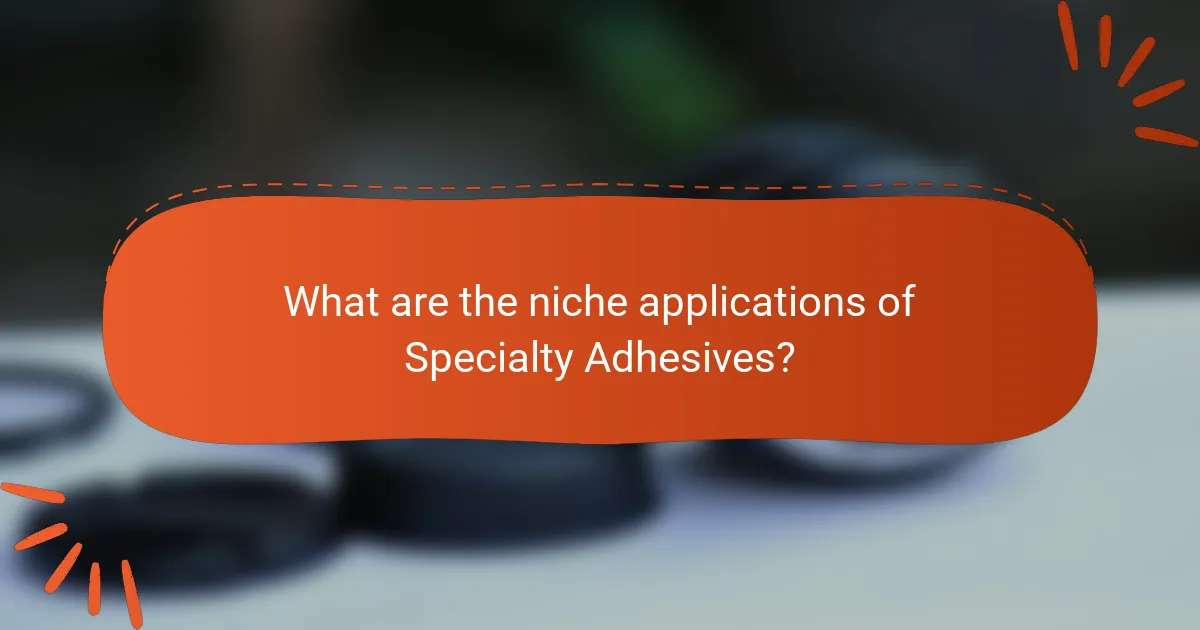
What are the niche applications of Specialty Adhesives?
Specialty adhesives have niche applications in various industries. They are used in electronics for bonding components securely. In the automotive sector, they facilitate lightweight construction and assembly. Specialty adhesives are also crucial in medical devices for secure and sterile bonding. The aerospace industry utilizes them for their high-performance requirements. Additionally, they find applications in construction for sealing and waterproofing. Their unique properties allow for customization in specific use cases. This versatility makes specialty adhesives essential in modern manufacturing.
How are Specialty Adhesives utilized in the automotive industry?
Specialty adhesives are utilized in the automotive industry for bonding various components. They provide strong adhesion for materials like metals, plastics, and composites. Specialty adhesives are essential for assembling lightweight vehicles. They help reduce overall vehicle weight, improving fuel efficiency. These adhesives also enhance structural integrity and durability. For example, epoxy-based adhesives are commonly used in chassis assembly. They can withstand extreme temperatures and vibrations. Additionally, specialty adhesives offer resistance to chemicals and moisture. This makes them suitable for automotive applications exposed to harsh environments.
What advantages do Specialty Adhesives provide in automotive manufacturing?
Specialty adhesives provide several advantages in automotive manufacturing. They enhance structural integrity by distributing stress evenly across joints. This reduces the risk of failure under extreme conditions. Specialty adhesives also offer superior bonding to various materials, including metals and composites. This versatility supports lightweight designs, which improve fuel efficiency. Additionally, they provide resistance to environmental factors, such as moisture and temperature fluctuations. This durability ensures long-lasting performance of automotive components. Furthermore, specialty adhesives can reduce the need for mechanical fasteners, simplifying assembly processes. This leads to decreased production time and cost efficiency.
What specific products use Specialty Adhesives in automotive applications?
Specialty adhesives are used in various automotive products. These include structural adhesives for bonding body panels. They are also utilized in assembling interior components like dashboards and door trims. Specialty adhesives are critical in attaching windshields and windows. Additionally, they are employed in bonding lightweight materials, such as composites and plastics. These adhesives enhance durability and performance in automotive applications. Their use is essential for achieving high-strength connections and reducing vehicle weight.
What role do Specialty Adhesives play in the construction industry?
Specialty adhesives play a critical role in the construction industry by providing robust bonding solutions for various materials. They enhance structural integrity by ensuring strong adhesion in applications such as flooring, roofing, and insulation. These adhesives are designed to withstand environmental stresses like moisture, temperature fluctuations, and chemical exposure. For instance, polyurethane adhesives offer excellent durability and flexibility, making them ideal for outdoor applications. Additionally, epoxy adhesives are known for their high strength and resistance to impact, which is crucial in load-bearing structures. The use of specialty adhesives can also streamline construction processes by reducing the need for mechanical fasteners. This results in faster project completion and lower labor costs. Overall, specialty adhesives significantly contribute to the efficiency, safety, and longevity of construction projects.
How do Specialty Adhesives enhance building materials?
Specialty adhesives enhance building materials by providing superior bonding strength and durability. These adhesives are formulated to withstand various environmental conditions, including moisture and temperature fluctuations. They improve the structural integrity of materials by distributing stress evenly across joints. Specialty adhesives also offer flexibility, allowing for movement without compromising the bond. Additionally, they can bond dissimilar materials effectively, expanding design possibilities. The use of specialty adhesives can reduce the need for mechanical fasteners, streamlining construction processes. Their application can result in lighter structures, improving energy efficiency. Research indicates that specialty adhesives can increase the lifespan of building materials by preventing delamination and degradation.
What are some examples of Specialty Adhesives used in construction?
Examples of specialty adhesives used in construction include polyurethane adhesives, epoxy adhesives, and silicone adhesives. Polyurethane adhesives provide strong bonding for a variety of materials. They are moisture-resistant and suitable for both interior and exterior applications. Epoxy adhesives are known for their high strength and durability. They are often used for bonding metal, glass, and concrete. Silicone adhesives offer flexibility and weather resistance. They are ideal for sealing joints and gaps in construction. These adhesives are essential for ensuring structural integrity and longevity in construction projects.
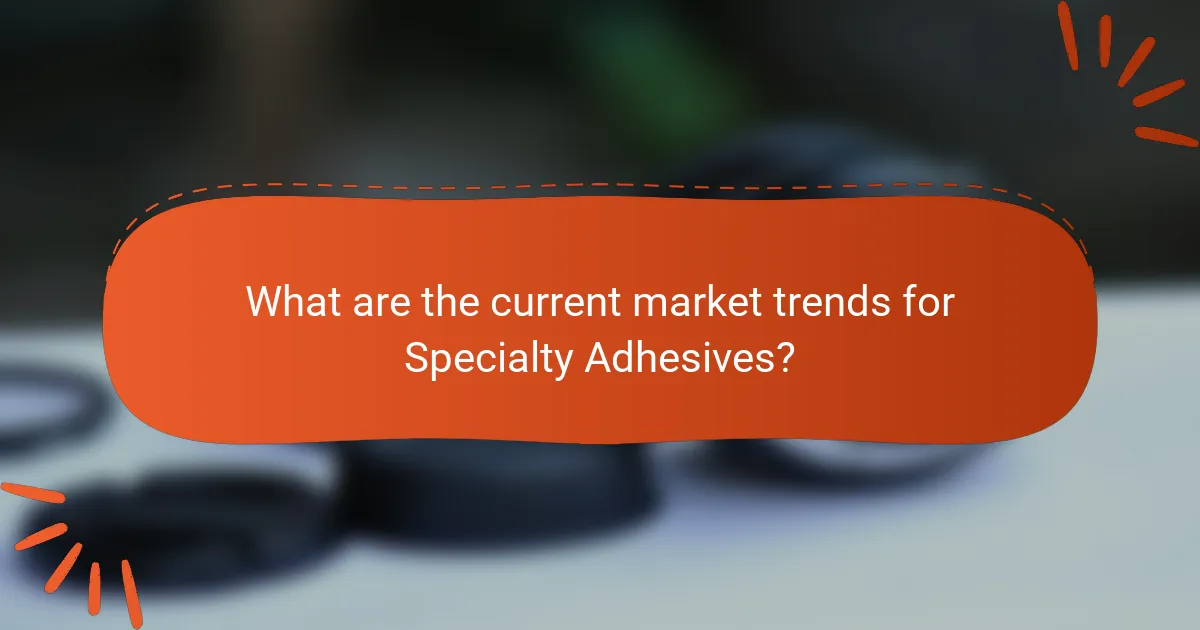
What are the current market trends for Specialty Adhesives?
The current market trends for specialty adhesives indicate a growing demand driven by various industries. The global specialty adhesives market is projected to reach approximately $12 billion by 2025. This growth is fueled by advancements in technology and increasing applications in automotive, construction, and electronics sectors. Eco-friendly and sustainable adhesive options are gaining popularity, reflecting consumer preferences for environmentally responsible products. Additionally, the rise of automation in manufacturing processes is enhancing the need for high-performance adhesives. The Asia-Pacific region is witnessing significant growth due to rapid industrialization and urbanization. Market players are focusing on innovation and product development to meet evolving customer needs.
How is the demand for Specialty Adhesives changing?
The demand for specialty adhesives is increasing significantly. This growth is driven by advancements in technology and expanding applications across various industries. The automotive, aerospace, and construction sectors are particularly contributing to this rise. According to a report by MarketsandMarkets, the specialty adhesives market is projected to grow from USD 15.8 billion in 2020 to USD 21.9 billion by 2025. This represents a compound annual growth rate (CAGR) of 6.6%. Additionally, the shift towards lightweight materials in manufacturing is further boosting the demand for effective bonding solutions.
What factors are driving growth in the Specialty Adhesives market?
The growth in the Specialty Adhesives market is driven by increasing demand in various industries. Key sectors include automotive, construction, and electronics. The automotive industry requires high-performance adhesives for lightweight materials. Construction applications benefit from adhesives that offer durability and weather resistance. Electronics manufacturers seek adhesives that provide thermal and electrical conductivity. Innovations in adhesive formulations enhance performance characteristics. Environmental regulations promote the use of eco-friendly adhesives. Market research indicates a projected CAGR of over 5% from 2021 to 2026. This growth is supported by rising consumer preferences for sustainable products.
How are innovations influencing the Specialty Adhesives market?
Innovations are significantly influencing the Specialty Adhesives market by enhancing performance and expanding applications. New formulations are being developed to improve adhesion, durability, and environmental resistance. For example, advancements in bio-based adhesives are reducing reliance on petroleum-based products. This shift aligns with increasing demand for sustainable materials. Additionally, innovations in curing technologies are allowing for faster production times. Enhanced properties such as heat and chemical resistance are also emerging from these innovations. The market is witnessing growth in sectors like automotive and construction due to these advancements. Overall, innovations are driving efficiency and sustainability in the Specialty Adhesives market.
What challenges does the Specialty Adhesives market face?
The Specialty Adhesives market faces several challenges, including stringent regulatory requirements. These regulations can complicate the manufacturing and distribution processes. Additionally, fluctuating raw material prices can impact production costs. This volatility creates uncertainty for manufacturers and consumers alike. Another challenge is the increasing competition from alternative bonding solutions. These alternatives may offer lower costs or easier application methods. Furthermore, the need for continuous innovation poses pressure on companies to develop new products. This demand for innovation can strain resources and budgets. Lastly, the market must address environmental concerns regarding sustainability and waste management. These challenges require strategic planning and adaptation from industry players.
How do regulatory changes impact Specialty Adhesives?
Regulatory changes significantly impact specialty adhesives by altering formulation requirements and compliance standards. These changes can affect the raw materials used in adhesives. For example, restrictions on volatile organic compounds (VOCs) lead to the development of low-emission alternatives. Manufacturers must adapt to these regulations to maintain market access. Non-compliance can result in penalties or product recalls. Additionally, changes can influence production costs and timelines. Adapting to new regulations may require investment in research and development. Overall, regulatory changes drive innovation in specialty adhesives to meet evolving standards.
What are the common issues faced by manufacturers of Specialty Adhesives?
Manufacturers of specialty adhesives commonly face issues related to formulation stability, regulatory compliance, and supply chain disruptions. Formulation stability is critical because many specialty adhesives require precise chemical compositions. Variations can lead to performance inconsistencies. Regulatory compliance poses challenges as manufacturers must adhere to various safety and environmental regulations. This can involve extensive testing and documentation. Supply chain disruptions can affect the availability of raw materials, impacting production timelines. Additionally, manufacturers may struggle with market competition and the need for continuous innovation to meet evolving customer demands. These challenges require strategic planning and adaptability to maintain market position.
What best practices should be followed when using Specialty Adhesives?
Use specialty adhesives according to manufacturer instructions for optimal performance. Ensure surfaces are clean and dry before application. Apply adhesives in well-ventilated areas to avoid inhaling fumes. Use the appropriate adhesive type for the specific materials involved. Store adhesives at recommended temperatures to maintain their effectiveness. Test adhesive on a small area before full application to ensure compatibility. Allow adequate curing time as specified by the manufacturer for maximum bond strength. Dispose of any unused adhesive according to local regulations to ensure safety and environmental compliance.
Specialty adhesives are unique bonding agents formulated for specific applications, offering superior performance compared to general-purpose adhesives. This article provides an overview of specialty adhesives, detailing their distinct properties, common types such as epoxy and polyurethane, and their critical roles in industries like automotive, aerospace, and construction. It further explores the current market trends, growth factors, challenges faced by manufacturers, and best practices for effective use. Through this comprehensive analysis, the article highlights the importance of selecting the right adhesive for niche applications and the innovations driving the specialty adhesives market.

